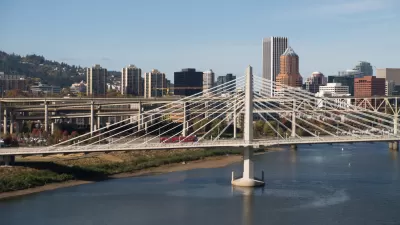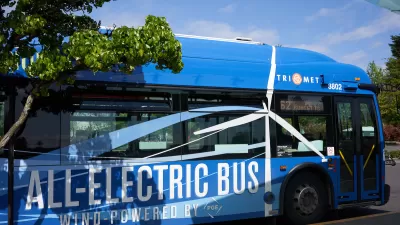To connect the South Waterfront area with the rest of the city, Portland is building a multi-modal bridge accommodating tram lines, streetcars, light rail lines, bicyclists, and pedestrians, but not automobiles.
Portland is yet again pioneering urban planning by building the first multi-modal bridge in the United States that does not allow cars. According to Brian Libby of CityLab, Tilikum Crossing, located in the South Waterfront area, "will carry MAX light rail trains (the impetus for construction) as well as Portland's streetcar line and city buses, and of course pedestrian and bike lanes on both sides—but no cars. If the bridge looks elegant in its slenderness, that may be because the omission of private automobiles keeps it from taking on a more gargantuan array of lanes and entry/exit ramps."
As David Blocher, executive director of capitol projects for TriMet, told Libby, "what makes this one so unique is basically because it's a product of its environment. There's not a road network at either end of it." Blocher continued by saying, "plus, we have this great redevelopment happening on both sides of the river, and we're going to carve it up with freeways on both sides? That's kind of a non-starter."
According to Blocher, Tilikum Crossing reveals the larger narrative "of heretofore mostly industrial waterfronts transitioning to public use; of an industrial economy transitioning to high tech and health care; and of more workers finding alternative means of getting to work."
FULL STORY: Why Portland Is Building a Multi-Modal Bridge That Bans Cars

Maui's Vacation Rental Debate Turns Ugly
Verbal attacks, misinformation campaigns and fistfights plague a high-stakes debate to convert thousands of vacation rentals into long-term housing.

Planetizen Federal Action Tracker
A weekly monitor of how Trump’s orders and actions are impacting planners and planning in America.

In Urban Planning, AI Prompting Could be the New Design Thinking
Creativity has long been key to great urban design. What if we see AI as our new creative partner?

King County Supportive Housing Program Offers Hope for Unhoused Residents
The county is taking a ‘Housing First’ approach that prioritizes getting people into housing, then offering wraparound supportive services.

Researchers Use AI to Get Clearer Picture of US Housing
Analysts are using artificial intelligence to supercharge their research by allowing them to comb through data faster. Though these AI tools can be error prone, they save time and housing researchers are optimistic about the future.

Making Shared Micromobility More Inclusive
Cities and shared mobility system operators can do more to include people with disabilities in planning and operations, per a new report.
Urban Design for Planners 1: Software Tools
This six-course series explores essential urban design concepts using open source software and equips planners with the tools they need to participate fully in the urban design process.
Planning for Universal Design
Learn the tools for implementing Universal Design in planning regulations.
planning NEXT
Appalachian Highlands Housing Partners
Mpact (founded as Rail~Volution)
City of Camden Redevelopment Agency
City of Astoria
City of Portland
City of Laramie




























